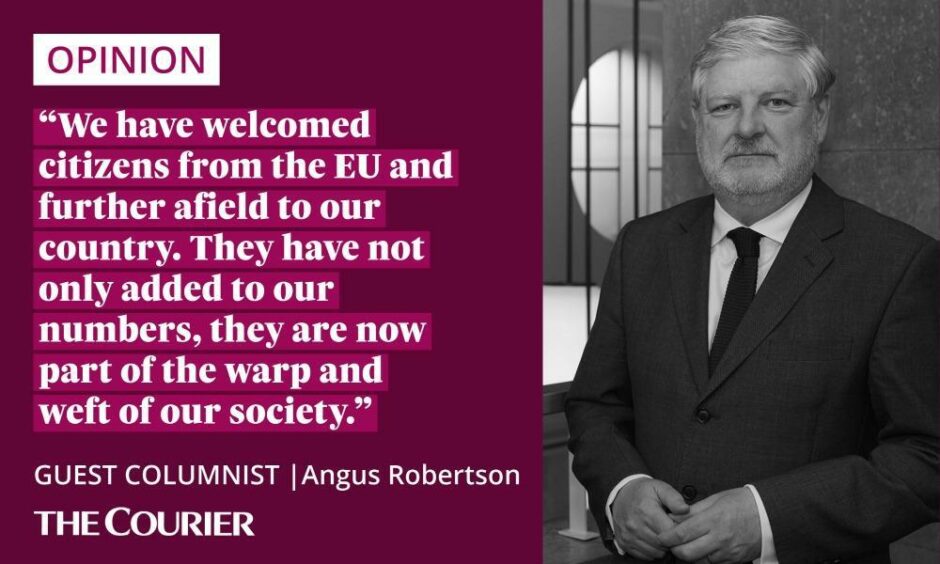As Ministers, we often talk about the ‘people of Scotland’.
And the future of the people of Scotland has, as ever, been at the core of my work this week.
But it’s been in a demographic context – the population of Scotland itself, its trends, trajectories and issues that need to be tackled.
These matters can sound dry and technical.
But they go to the heart of who we are and of our future prosperity.

Like many wealthy European nations Scotland has an ageing population.
But we have some specific challenges.
Our birth rate, for example, is lower than the rest of the UK, and falling.
Scotland’s future population growth is, in fact, entirely dependent on inward migration.
It may not be the position for the UK as a whole – but it certainly is the position for Scotland.
In recent decades, we have welcomed citizens from the EU and further afield to our country.
They are our friends and families, colleagues and peers. And they have enriched our communities, our culture, and our discourse
They have not only added to our numbers, they are now part of the warp and weft of our society.
They are our friends and families, colleagues and peers.
And they have enriched our communities, our culture, and our discourse – contributing to the diversity and variety of modern Scotland.
Scotland is a better place because they have been generous enough to live here – they are part of us.
UK immigration policy poses a threat
Brexit and the end of freedom of movement, along with the UK Government’s harsh immigration policy, now threatens our progress.
Indeed the impact is already being felt.
It is disappointing – and wrong – in recent days to see some suggest that such migration depressed wages.
In fact, analysis of European migration on the UK’s labour market has found that immigration is not a major factor on wages.
We are doing all we can to create jobs and provide rights skills for everyone in Scotland.
But on current trends our working population is expected to fall – and that will have serious consequences.
"Anti-immigration mentality is phenomenally dangerous especially for Scotland where we have a shrinking population", @scotfooddrink @scotfoodjames tells tonight's @EUandMeCampaign event. Says one Highlands company employs 1500 people but they're 200 short. Can't fill the gaps. pic.twitter.com/UHRrdhWl8E
— Lindsey Alexander (@RealLeQuinn) October 7, 2021
Which is why I chaired a meeting last week of our Population Taskforce, which includes Cabinet Secretaries and Ministers from across multiple portfolios.
We spoke about the impact on health, social care, social justice, housing, transport, education, public finance, equalities, business and trade.
It was a timely, detailed and useful discussion.
However, because of the remits of devolution, we have to work with and within the UK’s immigration policy, not our own.
There are strict limits on what actions the Scottish Government can take.
The power to develop a distinct, tailored and appropriate migration policy is one that an independent Scotland would have.
However, even now – if the UK Government listened to our views on this issue – there is absolutely no reason why Scotland cannot have a migration system tailored to Scotland’s needs.
Action is under way but we can do more
We could have a differentiated approach: it works in Canada, it works in Australia, it is doable.
But it takes willing on the part of the UK Government to recognise there are different circumstances in Scotland, and a will to get to grips with this problem.
And we need to get to grips with it now.
Which is why in my meeting with UK Immigration Minister Kevin Foster, I reiterated our request for urgent changes to immigration policy, including the opening of a new Temporary Worker Route.
While we have specific demands of the UK Government, we are doing our own work, within the constraints of our current powers.
Cabinet Secretary @AngusRobertson has welcomed a new report by the Expert Advisory Group (EAG) on Migration and Population, setting out 10 proposals to encourage and support families moving to Scotland.
News: https://t.co/6yjjyrdnX1 pic.twitter.com/ujqdhNNoGS
— ScotGovEurope (@ScotGovEurope) October 12, 2021
We are developing a rural visa proposal, to attract working age people to move to rural communities.
We plan to introduce Islands Bonds by summer 2022. These will provide up to £50,000 each for up to 100 households to encourage young people to either stay or move to our islands.
And we are in the early stages of developing a Migration Service for Scotland.
This work will continue.
And until Scotland has its own powers over immigration, we will do all that we can to convince the UK Government to change direction so that its migration policy responds to Scotland’s particular needs.
Angus Robertson is the MSP for Edinburgh Central and Cabinet Secretary for the Constitution, External Affairs and Culture.
